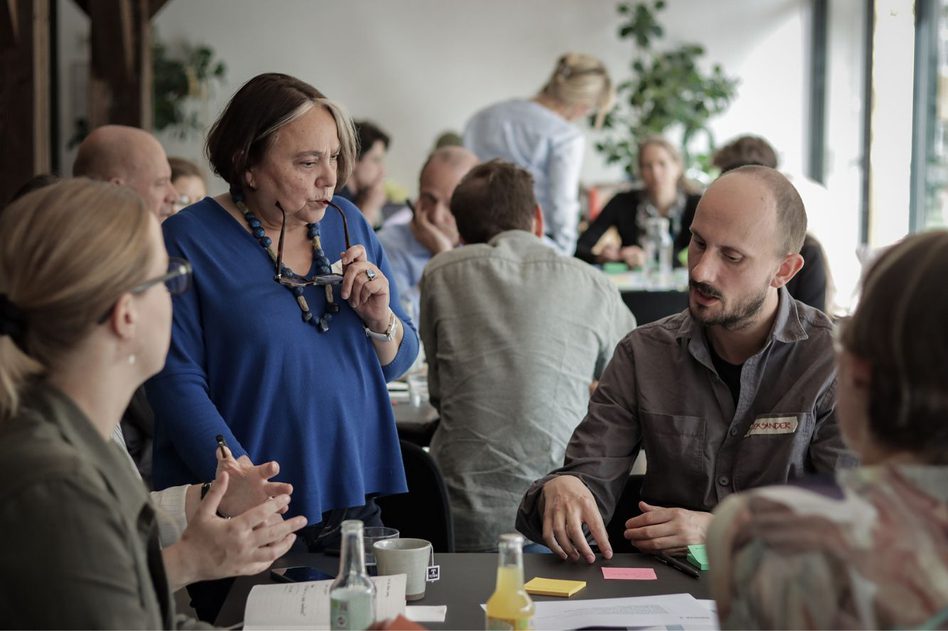Financing affordable housing in the green transition
13 September 2023

How can affordable housing be financed in the green transitioning happening in the built environment? BLOXHUB and the Institute for Human Rights and Business (IHRB) held a workshop to bring together experts, advocates, and other stakeholders to delve into the intersection of finance, housing, and green transition, focusing on aligning environmental aspirations with social commitments to ensure universal access to sustainable housing.
The workshop's central theme emphasised housing as a fundamental human right and explored the challenges and opportunities arising from environmental upgrades in building infrastructure, such as potential displacement and the financialisation of the sustainable housing market.

The talks covered a range of topics, including managing the green transition in the housing sector, the need for audacity, collaboration, and comprehensive investment plans, and addressing critical challenges such as ownership concerns and implementing retrofitting initiatives. Innovations in sustainable building and development were also discussed, highlighting the importance of efficiency in construction, proposing new business models, and advocating for regulation reform.
In a world in need of transformative change, the role of finance becomes paramount, urging businesses globally to commit deeply to the 'S' in ESG. Through financial mechanisms, businesses can ensure green buildings are more than just eco-friendly structures; that they are places everyone has the right to call home.
Andreia Fidalgo
Europe Programme Manager, IHRB
Participants scrutinised the prevailing housing system and governance structures, as well as addressed the revival of member-driven housing models, emphasising their role in community-building, fostering individual happiness, social cohesion, and sustainability, both environmentally and socially.
Key takeaways
- Advocacy for Universal Housing Rights: Advocacy for policies recognising housing as a fundamental human right is essential for ensuring equitable access and addressing social inclusion
- Balancing Sustainability & Affordability: Striking a balance between sustainability and affordability is crucial to prevent displacement and exclusion, especially among vulnerable populations, while promoting green transitions in housing.
- Mitigating Financialisation Impact: Treating housing primarily as a financial asset can worsen housing crises, hinder affordability, and result in displacement, especially in vulnerable communities.
- Community-centred Decision-making: Community participation in co-creation and decision-making processes is paramount for crafting inclusive and customised sustainable housing solutions. Providing backing and resources for community-led endeavours that cater to specific local housing demands and align with sustainability goals is pivotal for enacting substantive transformation.
- Reforming Policies for Affordability: Reevaluating zoning, land pricing, and financial incentives are essential for fostering affordable and sustainable housing initiatives.
- Embracing Construction Innovation: Adopting cutting-edge construction technologies and methods is critical to reducing costs, minimising environmental impact, and enhancing housing quality.
- Promoting Public-Private Collaboration: Fostering partnerships between the public and private sectors is vital for securing necessary funding and effectively implementing sustainable housing projects.
- Monitoring Progress & Impact: Establishing clear metrics and monitoring mechanisms allows for effectively assessing the progress and impact of sustainable housing initiatives and ensuring they meet the desired outcomes.
- Exploring New Business Models: Examining and adopting innovative business models, like those proposed by Almenr and Home.Earth, is important for maximising impact and addressing the diverse needs of the housing sector.
- Interdisciplinary Approach: A concerted, interdisciplinary effort is needed to navigate the multifaceted challenges at the intersection of finance, housing, and green transition, with a collective commitment to addressing these complexities.




